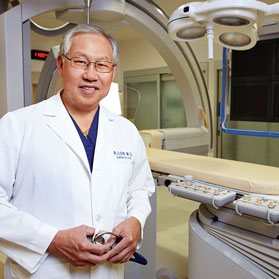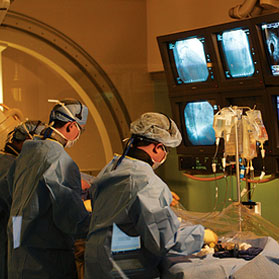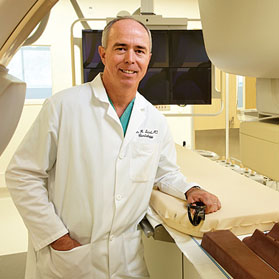A new era in cardiovascular care
Comprehensive care expands to benefit the region – and beyond
 With its comprehensive range of specialties, technologies, clinical trials, outreach programs and focus on patient care, UC Davis Health System is widely recognized as the premier cardiovascular care provider for the Northern California region.
With its comprehensive range of specialties, technologies, clinical trials, outreach programs and focus on patient care, UC Davis Health System is widely recognized as the premier cardiovascular care provider for the Northern California region.
Individuals with heart and vascular diseases have access to sophisticated therapeutic procedures, advanced imaging and other complex cardiovascular services offered only by an academic health center. With the completion this fall of the Surgery and Emergency Services Pavilion project at UC Davis Medical Center, these capabilities have risen to a whole new level.
"We’re very proud of our many cardiology specialty clinics, our diverse noninvasive cardiology capabilities, and our advanced imaging tools," says cardiologist Reginald Low, chief of cardiovascular medicine. "We’re excited about having state-of-the-art facilities in the pavilion to support the expertise within our cardiology, vascular and surgery units."
High demand, high tech
The need is significant. Nearly 81 million Americans over age 20 — or one out of every three adults — have one or more types of cardiovascular disease such as high blood pressure, coronary heart disease or congestive heart failure. Peripheral vascular disease is estimated to affect up to 10 million Americans.
UC Davis Health System already has developed a wide array of specialties within cardiovascular health that positions it to provide a full spectrum of heart and vascular care augmented by a rich variety of education and outreach programs.
"We’re very proud of our many cardiology specialty clinics, our diverse noninvasive cardiology capabilities, and our advanced imaging tools. We’re excited about having state-of-the-art facilities in the pavilion to support the expertise within our cardiology, vascular and surgery units."
For cardiology, that includes programs designed to reduce the risk of heart disease, rehabilitate patients after a cardiac event, treat existing coronary artery disease, and provide patients alternatives to surgical treatments. For vascular medicine, specialties include treating peripheral artery disease, cerebrovascular disease and diabetes-associated vascular conditions. And when surgery is required, skilled surgeons are available for complex diseases of the heart and aorta, peripheral arteries, chest, lungs and esophagus.
The pavilion, a 470,000-square-foot addition to UC Davis Medical Center, includes a state-of-the-art catheterization and electrophysiology laboratories, and an
"In the new suite, a surgeon can simultaneously conduct endovascular surgery and open vascular surgery, two procedures that often are necessary in treating peripheral artery disease and other conditions," says UC Davis Vascular Center’s medical director John Laird, an interventional cardiologist who has lectured and performed endovascular procedures around the world.
Although these operations can be done separately, there’s less risk and much shorter recovery time for patients with the combined approach.
"It’s a remarkable facility that allows us to provide the people we treat with the most advanced, most sophisticated care," says Laird.

For example, an advanced Stereotaxis magnetic catheter guidance system in the electrophysiology laboratory will allow physicians to remotely perform catheter manipulation and mapping inside the heart and vascular system, decreasing radiation exposure. UC Davis will be one of just a few sites in the entire western U.S. with this capability.
Enhanced imaging within the operating suites is a particularly significant advancement that will allow care teams to immediately assess surgical outcomes, says J. Nilas Young, chief of cardiothoracic surgery. He points out other advancements as well, such as robust robotic surgery capabilities and the ability to perform angiographic examination of blood vessels within the operating-room setting.
"Our range of services is already extremely broad, which is why we see patients on referral from so many sources, and I think the pavilion will allow us to broaden them even further," says Young.
Beyond the new facilities within the medical center, UC Davis physicians see clinical trials as another key in offering the latest treatments.
"UC Davis augments its services by offering a number of clinical trials targeting new medications for heart disease," Jason Rogers, director of interventional cardiology, says.
Low, Rogers and others in Cardiology look to clinical trials to bring new treatments to patients that are not commonly available at other facilities. Current trials include using stem cells for regeneration of cardiac muscle after heart attacks and using the minimally invasive Abbot MitraClipTM to treat patients with mitral regurgitation as an alternative to open-heart surgery. Other trials use medicated stents and intravascular ultrasound technologies to treat coronary artery disease.
Teams and training
To prepare operating-room nurses for the transition to the new facility – and to create a sense of collaboration and team-building – vascular surgeon David Dawson conducted simulated operations in the pavilion’s new cardiovascular-specific operating room.
"Throughout the Central Valley, you can find good hospitals, physicians and nurses, but none of them have pulled it all together into a real team as we have," he says.

An expert on the use of simulations as a cardiovascular training technique for physicians, nurses and students, Dawson led a recent study that showed surgery residents trained on virtual-reality simulators improved their overall performance and reduced procedure times when treating their patients.
Likewise, at the start of a new program in minimally invasive stenting five years ago, nurses from the catheterization lab performed carotid artery stenting procedures in a simulated environment. By the time they saw patients they were already experienced, Dawson recalls.
Dawson and his peers are strong advocates of remote viewing of procedures as a learning tool – and are enthused about the new pavilion operating rooms’ advanced live-video capabilities.
"It’s a remarkable facility that will allow us to provide the people we treat with the most advanced, most sophisticated care."
The sophisticated telecommunication equipment will allow UC Davis physicians to share voice and visual medical information with physicians elsewhere over the Internet. It will facilitate consultations with other specialists at remote locations and it will allow students and others to learn by watching operations and procedures remotely, whether across town in Sacramento or around the world.
The distance-education model is already in place at the medical center. In 2009, Laird, Low and others performed complex surgeries that were broadcast live to more than 2,000 participants at the Transcatheter Cardiovascular Therapeutics meeting in San Francisco.
UC Davis’ continuing medical and nursing education programs employ similar video and online courses that enhance the access of health professionals to the latest developments in their areas of care.
Individual care for complex problems
When it comes to health education and outreach, nurses play a crucial role.
"Our Vascular Center nurses provide education and much-needed support for individuals and their families who are dealing with complex cardiovascular problems," explains hospital nurse coordinator Kay Behan, who coordinates care for people undergoing surgical and endovascular therapies and also develops patient-care plans at discharge.
"If you have any health problems, heart-related or beyond, go to UC Davis Medical Center for super care."
— Dick Martinez, patient
She additionally arranges for continuing medical education guest speakers, including a grand rounds earlier this year by University of Washington School of Nursing Associate Dean of Technology Innovations in Education and Research Brenda Zierler, discussing her research on the use of simulation to improve communication and teamwork skills among health professionals.
Cardiovascular patients appreciate UC Davis’ focus on team-spirited care, outreach and education.
Dick Martinez, 71, knows UC Davis well after undergoing a tumor removal, open-heart bypass surgery and several diabetes-related foot procedures over the last decade. A weight-training enthusiast who’s as energetic as can be, he now routinely visits doctors at both the Sacramento campus and the Elk Grove clinic for follow-up care.
"If you have any health problems, heart-related or beyond, go to UC Davis Medical Center for super care," Martinez says.
"I’m healthy today, except for the diabetes, and I’m as ornery as ever," he quips. "I don’t wish for anyone to get sick, but, if you must get sick, UC Davis Medical Center is the place to go."







